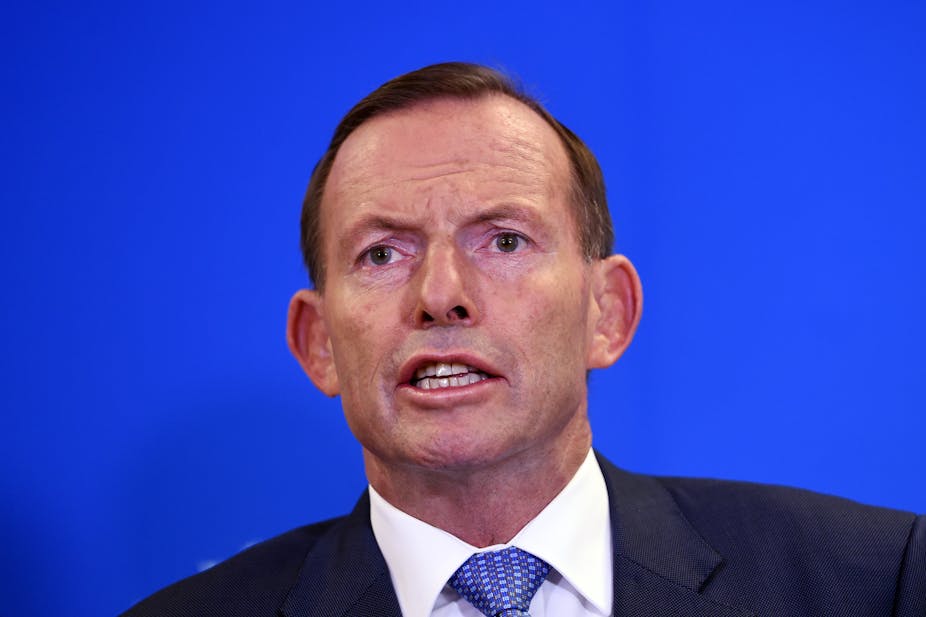Tony Abbott insists that “the system” let Australians down by not heading off siege gunman Man Haron Monis long before he ever got near the Lindt cafe in Martin Place.
“This monster should not have been in our community,” the prime minister told a news conference on Sunday.
“He shouldn’t have been allowed into the country. He shouldn’t have been out of bail. He shouldn’t have been with a gun. And he shouldn’t have become radicalised.”
Yet the report Abbott released, done by the secretaries of his department and the NSW premier’s department, has found only limited faults with the system.
It said that overall “the judgements made by government agencies were reasonable” and “the information that should have been available to decision-makers was available”.
“Decisions made to grant Monis visas and Australian citizenship were made in accordance with the laws, policy and procedures of the time.”
Monis didn’t have a gun licence (which Abbott once asserted). Monis received government benefits at various times, but he didn’t rip off the social security system.
At the start, better checking by Australian officials in Iran before Monis got his original business visa to come to Australia would have revealed holes in his story – but the processing was high volume. And at the end, obviously things would have been totally different if he hadn’t been granted bail after being charged with serious offences.
In between, Monis was repeatedly subjected to checks by ASIO and the police. While seen as engaging in offensive and provocative behaviour, he was not regarded as a candidate to commit a terrorist act.
The national security hotline received 18 complaints about Monis’ Facebook page in December 2014, the month of the siege. They were assessed not to indicate a desire or intent to engage in terrorism.
As Abbott said: “The Martin Place murderer right up to the very end was not specifically advocating violence against Australians. He simply went out and practiced violence against Australians.”
The unpalatable reality is that in some cases a person’s behaviour is not predictable, whether they are a “lone wolf” who commits an act of terror, invoking ideology, or someone who suddenly goes from verbal abuse to murdering a family member.
Not every crime is preventable, however good the “system”.
Abbott himself noted from the report that while Monis was “well and truly on a lot of radar screens, he was routinely assessed as not being a threat to himself or the community. Plainly, at some stage he did become a threat.”
Security agencies can only keep watch, have conversations, share information, make assessments. The latter involve judgements about risk. There are a lot of wild people out there, as Abbott would know from his prime ministerial letterbox. Only a tiny minority will become dangers to the community, and identifying those is never going to be a perfect science.
The report has proposed various changes, all accepted by the government. It said the Department of Immigration should improve its ability to verify information from applicants for visas to travel to Australia, better assess the possible risks posed by individuals at the pre-visa, post-visa and pre-citizenship stages and propose legislative changes for revoking visas and citizenship.
An overhaul of bail arrangements is recommended – the NSW government has already taken some action. The report also urges that the issue of illegal firearms be further addressed; the operation of control orders and preventative detention orders be monitored “to ensure they meet evolving operational needs”; and work to combat radicalisation be stepped up (again, already underway).
Abbott will announce details of the initiatives in his Monday statement on national security.
The review says its recommendations “would maintain broadly the current balance in our existing regulatory and legislative framework”.
Its “decision to not propose steps beyond this is based on our view that introducing substantial further controls involves a larger choice about the sort of society we wish to live in and is properly the province of the public and our elected representatives.
"Any further controls would be based on judgements as to whether increases in policing, surveillance and controls and the related extra burden on the taxpayer and intrusions into Australians’ lives would make us appreciably safer,” the secretaries said.
Abbott, though leading a government believing in individualism, suspicious of regulation, and previously committed to loosening the legislative constraint on racially offensive speech, is signalling that he does want to go further.
Abbott said that “at every stage” Monis was given “the benefit of the doubt” and the cumulative effect “is that he was able to wreak havoc on our community”.
Highlighting the ongoing debate between the rights of the individual and the community’s protection, Abbott said: “My judgement is that – while having always to respect both – the question of precisely where we draw the line in the era of terrorism will have to be reconsidered and the line may have to be redrawn”.
For Abbott, national security has become a signature issue, with extensive legislation already passed, some still before the parliament, and now more measures to come, including action against the radical Islamist group Hizb ut-Tahrir. He has been driven by events but also has a keen eye to the politics.
Labor has been marching in step, preventing it becoming a partisan issue. Monday’s statement by Abbott will give an indication of precisely how far he now intends to shift the goalposts.
POSTSCRIPT The secretaries’ review did not deal with one of its terms of reference – to look at any lessons learnt by the police about the handling of the siege. The report said the review consulted with the NSW Coroner “and agreed that it would not be appropriate at this time for this report” to do so.

